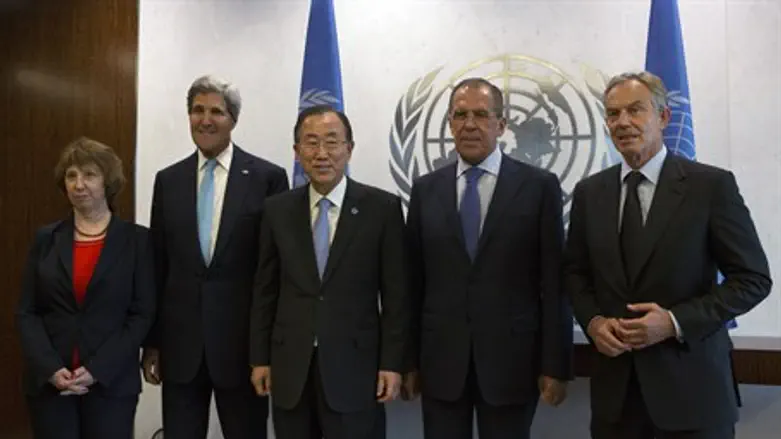
Palestinian Arab incitement to terrorism must stop, but so should Israel's “settlement construction”, the Middle East Quartet said in its report released on Friday.
The United States, European Union, Russia and the United Nations – which comprise the quartet -- said that Israel's construction of homes in Judea and Samaria, demolition of Palestinian homes and alleged “confiscation” of land were "steadily eroding the viability of the two-state solution."
"Israel should cease the policy of settlement construction and expansion, designating land for exclusive Israeli use, and denying Palestinian development," the report said.
"This raises legitimate questions about Israel's long-term intentions, which are compounded by the statements of some Israeli ministers that there should never be a Palestinian state," it added.
But the report also condemned the Palestinian Authority (PA) leaders' continuous incitement to violence against Israelis.
"Regrettably," it said, Palestinian leaders "have not consistently and clearly condemned specific terrorist attacks" while streets and squares have been named after Palestinians who have carried out the violence.
"The Palestinian Authority should act decisively and take all steps within its capacity to cease incitement to violence and strengthen ongoing efforts to combat terrorism, including by clearly condemning all acts of terrorism," it said.
The report includes 10 recommendations in order to solve the ongoing conflict:
- “Both sides should work to de-escalate tensions by exercising restraint and refraining from provocative actions and rhetoric.
- “Both sides should take all necessary steps to prevent violence and protect the lives and property of all civilians, including through continuing security coordination and strengthening the capacity, capability and authority of the Palestinian Authority Security Forces.
- “The Palestinian Authority should act decisively and take all steps within its capacity to cease incitement to violence and strengthen ongoing efforts to combat terrorism, including by clearly condemning all acts of terrorism.
- “Israel should cease the policy of settlement construction and expansion, designating land for exclusive Israeli use, and denying Palestinian development.
- “Israel should implement positive and significant policy shifts, including transferring powers and responsibilities in Area C, consistent with the transition to greater Palestinian civil authority contemplated by prior agreements. Progress in the areas of housing, water, energy, communications, agriculture, and natural resources, along with significantly easing Palestinian movement restrictions, can be made while respecting Israel's legitimate security needs.
- “The Palestinian leadership should continue their efforts to strengthen institutions, improve governance, and develop a sustainable economy. Israel should take all necessary steps to enable this process, in line with the Ad Hoc Liaison Committee recommendations.
- “All sides must continue to respect the ceasefire in Gaza, and the illicit arms buildup and militant activities must be terminated.
- “Israel should accelerate the lifting of movement and access restrictions to and from Gaza, with due consideration of its need to protect its citizens from terrorist attacks.
- “Gaza and the West Bank should be reunified under a single, legitimate and democratic Palestinian authority on the basis of the PLO platform and Quartet principles and the rule of law, including control over all armed personnel and weapons in accordance with existing agreements.
- “Both parties should foster a climate of tolerance, including through increasing interaction and cooperation in a variety of fields – economic, professional, educational, cultural – that strengthen the foundations for peace and countering extremism.”
AFP contributed to this report.
(Arutz Sheva’s North American desk is keeping you updated until the start of Shabbat in New York. The time posted automatically on all Arutz Sheva articles, however, is Israeli time.)
